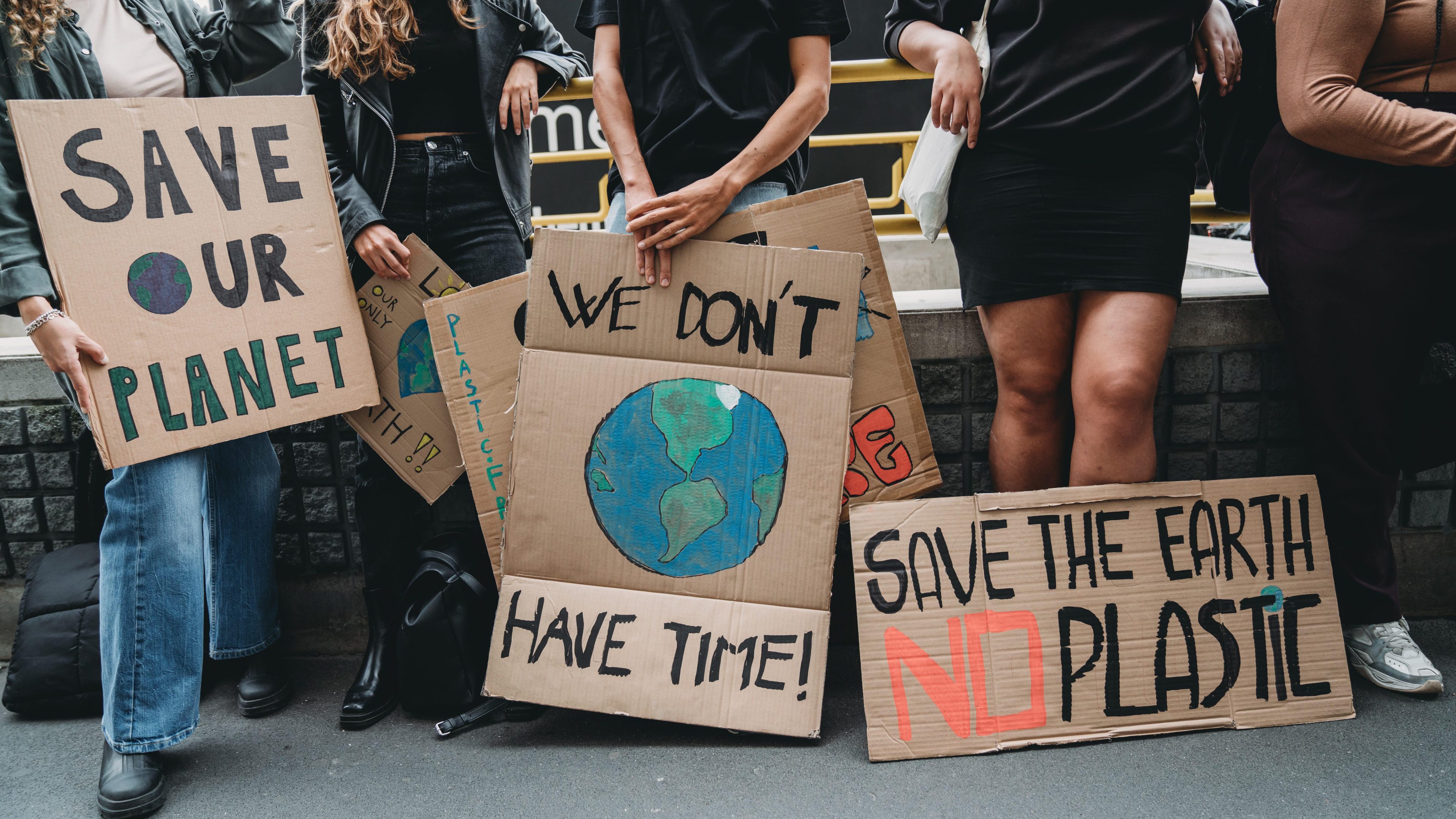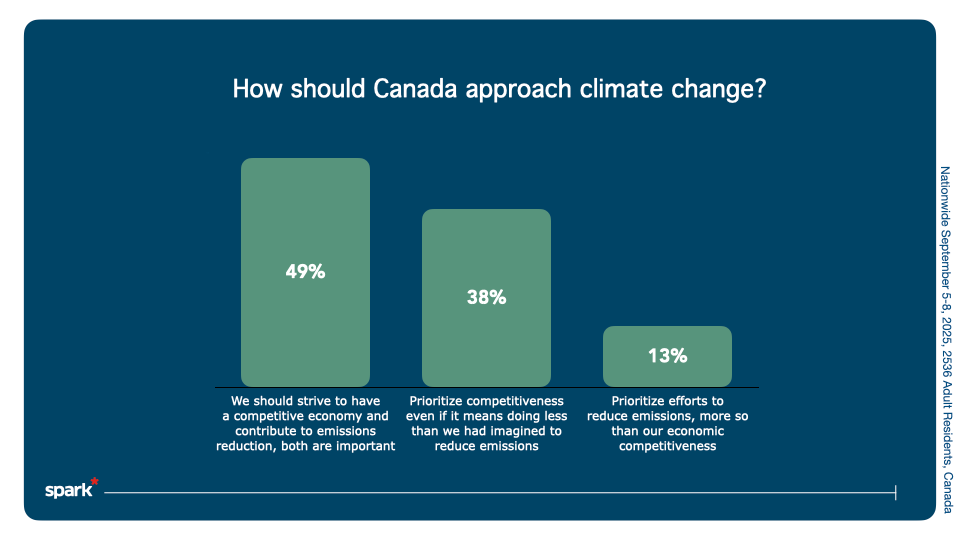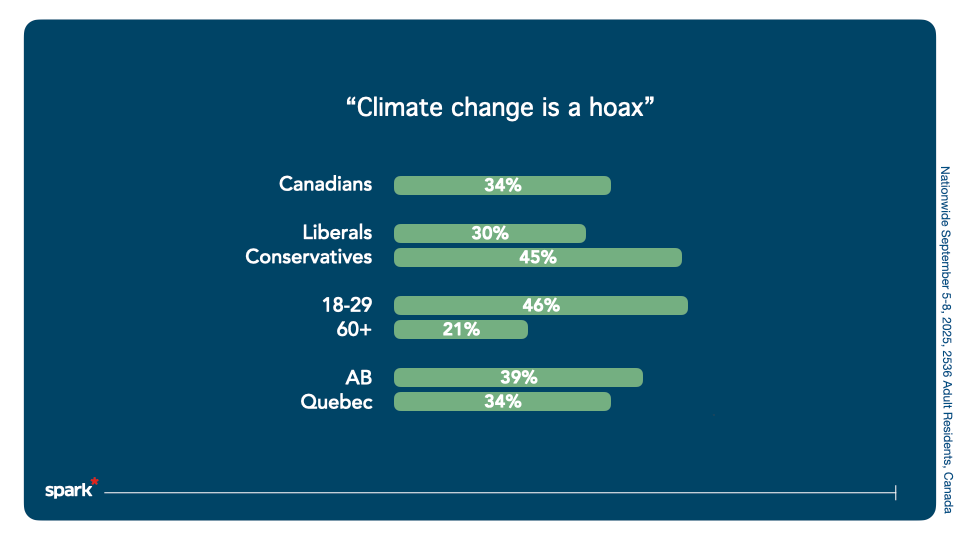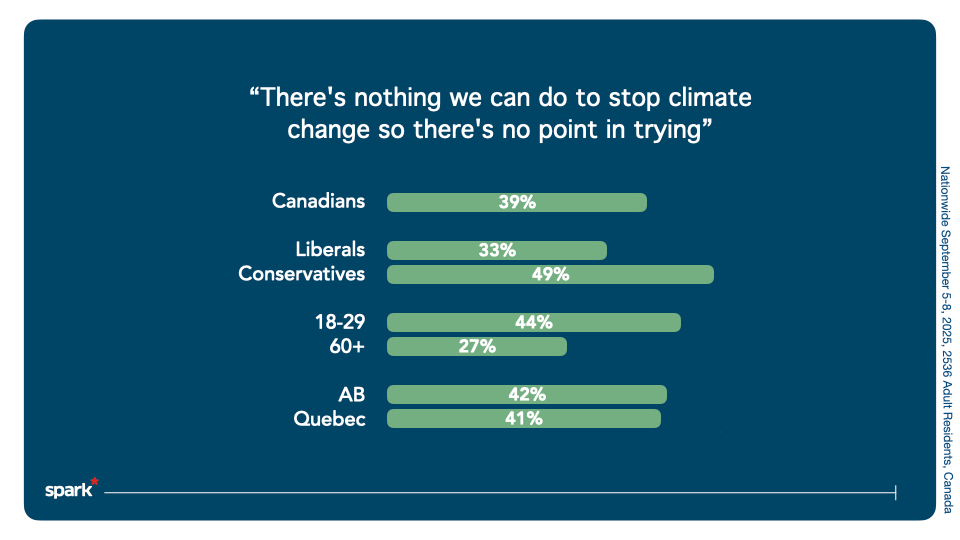Subscribe for more!
Subscribe to our newsletter for insights and articles on wide ranging issues including reputation management, branding, advertising, awareness, advocacy, and communications. You can unsubscribe anytime.
Follow us on social:

Economic anxiety, climate misinformation, and defeatism are re-drawing the political landscape when it comes to climate policy.
This is a challenging post to write, because I personally believe climate change is real and an urgent problem. I first started measuring public opinion about climate change more than 20 years ago. I watched as the issue moved from a small topic to a broad consensus, and as voters pushed politicians for more action, more quickly.
About 10 years ago, the large majority of Canadians became convinced that the cleanest economies will be the most successful economies, and that Canada should strive to be among the leaders in shifting our economy in ways that reduced carbon emissions.
A lot of that opinion is still intact. But some things have changed.
To many Canadians, the world no longer looks like it’s engaged in a race to decarbonize. The US is led by a President who believes climate change isn’t real and has dismantled policies designed to reduce emissions. Instead of America’s companies leading the decarbonization push, Trump is creating a race towards the bottom, ridiculing and dismantling America’s electric vehicle opportunities, mocking solar and wind energy as “The Scam of the Century” and signing an executive order titled “Reinvigorating America’s Beautiful Clean Coal Industry”.
Were it not for the fact that Canada faces trade and tariff threats that are unprecedented in scale, Canadian opinion might not be affected by this shift in the US.
But people in Canada are worried. In our Spark survey last month, 92% felt that Canada was facing more serious economic challenges than it has in decades.
And so, when it comes to the climate policy people want, it’s not really surprising that Canadians want their governments to choose approaches that will help, or at the very least, not risk putting a drag on the economy.
Just last week, in our latest national survey ( 2536 Adult, nationwide) we probed the connection of climate policy with competitiveness. We offered respondents three choices, prioritizing the economy over climate, prioritizing emissions reduction, or pursuing both together. Half said they preferred a “climate and competitiveness” stance. Among the rest, there was a 3:1 lean towards economy over climate.

It’s important not to over-read this.
Most Canadians continue to believe you can improve competitiveness and reduce emissions at the same time, and that these are mutually reinforcing goals.
But the consensus on that point is shakier when the world’s largest economy is trying to gain economic advantage by heading in the opposite direction.
The US posture on climate and trade isn’t the only thing weakening the climate action consensus in Canada.
Anti-climate activism and disinformation are also taking a toll. Today, 34% agree “Climate change is a hoax”. People under 30 are more twice as likely (46%) as people over 60% (21%) to think this way. Conservatives (45%) are more likely to buy the “hoax” story, but it might come as a surprise that 30% of Liberals and New Democrats feel this way too. The constant battering of institutions has led to a steady decline in institutional trust, and when the algorithms find mistrust, they fertilize it hourly. Today 75% believe “most of our institutions have failed us and need to be completely changed”. (64% on the left/84% on the right agree with this)

Some Canadians have grown defeatist about climate change as well. About four in ten (39%) agree “there’s nothing we can do to stop climate change so there’s no point in trying”. Albertans (42%) and Quebecers (41%) are equally likely to agree with this thought - it wasn’t long ago that there were no two provinces that were further apart when it came to opinions about climate change.

Put these factors together, while there was a climate consensus in Canada, that consensus isn’t broken, but it is bending.
Economic anxiety makes people want to avoid anything that might seem risky, and climate policies that might make some of our industries less competitive, even temporarily, feels like a harder risk to take in the context of a tariff and trade fight.
Successive elections in Canada where Conservatives campaigned on the idea that fighting climate change was making households poorer have built up skepticism about climate change and resistance to climate action.
And so, the path ahead for people who believe it is imperative to continue to reduce emissions is different in 2025. The public will to act isn’t lost, but it can’t be taken for granted. The burden of proof has shifted - the moral case for climate action still matters to many - but plenty of others also want to know how climate policy will help Canadian workers and companies compete with the rest of the world.
Canadians will want to support decarbonization efforts, but are much more likely to do so, when they see these efforts are geared towards - or linked to - improving Canada’s economic prospects.
The data referenced were gathered online, with a representative sample of 2536 adults across Canada, between the dates September 5, 2025 and September 8, 2025.
spark*insights is led by Bruce Anderson, one of Canada’s leading and most experienced public opinion researchers. From polling and research to analysis and guidance, we help organizations, uncover the factors driving or influencing public perception to gain valuable insights into the shape and movement of the landscape.